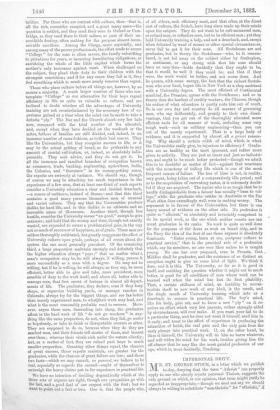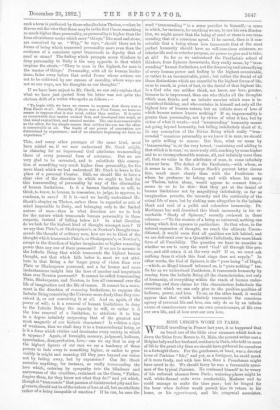IMPERSONAL DEITY. AI R. ST. GEORGE STOCK, in a letter which
we publish to-day, denying that the term " Atheist " can properly apply to one who simply rejects personal Theism, suggests the only ground on which, in our opinion, that term might justly be regarded as inappropriate,—though we need not say we should always be willing to substitute " non-theistic " for "atheistic," if such a term is preferred by those who disclaim Theism,—when he throws out the view that there maybe in the first Cause something as much higher than personality, as personality is higher than the form of existence under which mere "things," like sand and stone, are conceived by us. "Why," he says, "should there not be forms of being which transcend personality more even than the existence of a conscious agent transcends in dignity that of sand. or stone P The feeling which prompts many thinkers to deny personality to Deity is the very opposite to that which inspires the strain,—' Glory to man in the highest, for man is the master of things.' Personality, with all its human limita- tions, fades away before that awful Power whose actions are not to be criticised by our canons of morality, whose ways are not as our ways, nor his thoughts as our thoughts."
If we have been unjust to Mr. Stock, we can only explain that what we have just quoted from his letter was not quite the obvious drift of a writer who spoke as follows :— "To begin with, we have no reason to suppose that there was a First Cause at all. Secondly, if there was a First Cause, we have no reason to suppose that it was mind, rather than matter. It is quite as conceivable that matter existed first, and developed into mind, as that mind existed first, and created matter. The one is as conceivable as the other, for the simple reason that neither the one nor the other is conceivable at all. The limits of our power of conception are determined by experience ; and of an absolute beginning we have no experience."
This, and many other passages of the same kind, must have misled us, if we now understand Mr. Stock aright, in claiming for an impersonal God attributes transcending those of every personal form of existence. But we are very glad to be corrected, and to substitute this concep- tion of something very much higher than personality, for the mere blank which we had understood Mr. Stock to leave in the place of a personal Creator. Still, we should like to have a dear view of the direction in which we ought to look for this transcending of personality by way of the elimination of human limitations. Is it a human limitation to will, to think, to know, to foresee, to remember, to judge, to approve, to condemn, to save ? If it is—and we hardly understand Mr.
Stock's chapter on Theism, unless these be regarded as acts of mind impossible to Deity, and belonging only to the limited nature of man—then in what direction are we to look for the nature which transcends human personality in these respects, instead of falling below it P In what direction do we look for the highest kind of thought amongst men P If we say that Plato's, or Shakespeare's, or Newton's thought tran- scends the thought of ordinary men, how are we to think of the thought which transcends Plato's, or Shakespeare's, or Newton's, except in the direction of higher imaginative or higher reasoning power than any one of them possessed? If we are to assume in the Infinite Being that which transcends the highest human thought, not that which falls below it, must we not attri- bute to that Being a far larger grasp of vision than ever Plato or Shakespeare possessed, and a far keener and more instantaneous insight into the laws of number and Magnitude than ever Newton possessed? It cannot be called transcending Plato, Shakespeare, and Newton, to lose all command over the life of imagination and the life of reason. It cannot be a move- ment in the direction of removing limitations, to suppose the Infinite Being conceiving the Universe more dimly than they con- ceived it, or not conceiving it at all. And so, again, of the power of will ; is it a removal of human limitations to deny to the Infinite Being the capacity to will, or rather is it the true removal of a limitation, to attribute it to him in a degree infinitely surpassing that of the greatest and most magnetic of our historic characters ? Is volition a sign of weakness, that we shall deny it to a transcendental being, or is it a force which vivifies and dominates every society in which it appears P Again, of foresight, memory, judgment, holiness, approbation, disapprobation, love,—can we say that in any of the highest figures of our race we see a tendency of these powers to fade away in something higher, or rather to grow visibly in might and meaning till they pass beyond our vision not by fading away, but by expansion ? Can Mr. Stock conceive anything, for instance, as really transcending the love which, entering by sympathy into the blindness and narrowness of the crucifiers, exclaimed on the Cross, "Father, forgive them, for they know not what they do !" and yet which, though it " transcends " that passion of disinterested pity and for- giveness, should not be of the nature of love at all, but an attribute rather of a being incapable of emotion If he can, he uses the word " transcending" in a sense peculiar to himself,—a sense in which, for instance, for anything we see, to use his own illustra- tion, we might assert that the being of sand or stone is one trans sanding that of a conscious agent. If he cannot, then is it con- ceivable that a being whose love transcends that of the most perfect humanity should have no self-conscious existence, no interior life and no exterior purpose, no power to give and to take, at all? So far as we understand the Pantheistic school of thinkers, from Spinoza downwards, they really mean, by "tran- scending" human limitations, not the deepening and intensifying of every human power and feeling to the highest conceivable, or rather to an inconceivable, point ; but rather the denial of all those distinctions which are essential to the highest forms of life, so as to result, in point of fact, in the denial of that highest life. Is a God who can neither think, nor know, nor love, greater, because he is impersonal, than one who thinks all the thoughts which man thinks and an infinite number which man is in- capable of thinking, and who contains in himself not only all the highest love of human nature, but an infinite store of love of which human nature knows nothing ? If so, impersonality is greater than personality, not by virtue of what it has, but by virtue of what it wants,—and transcending' humanity means not going beyond humanity, but falling indefinitely short of it. In any conception of the Divine Being which really " tran- scended " conscious personality as weynow it in man, we should be quite willing to concur. But then, what we mean by tra,useending ' is, at the very lowest, 'containing and adding to that which is in man,' or, more truly still, reaching by some higher and to us incomprehensible avenue, all, and infinitely more than all, that we value in the attributes of man, in some infinitely intenser form. The defect of the Pantheists,—with whom, as it seems to us, Mr. St. George Stock's present letter classes him, much more closely than with the Positivists to whom he professes to belong and with whom his essay on Theism, taken alone, would appear to connect him,— seems to us to be this : that they get at the denial of human limitations not by magnifying indefinitely, so far as imagination permits, the intensity and the continuity of the actual life of man, but by sinking man altogether in the infinite blank and void of a pallid and colourless immensity. Dr. Martineau has well described this blank immensity in his re- markable " Study of Spinoza," recently reviewed in these columns :—" To the essence of a being as universal, nothing can belong which first appears in particulars. So that when, in the natural expansion of thought, we reach the ultimate Uncon- ditioned, it would seem that all qualities are left behind, and we are delivered over to a Quantitive Infinitude, the mere blank form of all Possibility. The question we have to consider is whether we are to carry the word God' all through this pros cess, and still retain it at the very end? If so, we must ask nothing from it which this final stage does not supply." In other words, the God of Spinoza is the "pure being" of Hegel, —which, as Hegel himself informed us, is "pure nothing" too.
So far as we understand Pantheism, it transcends humanity by erasing from the Infinite Being all the characteristics, net only of humanity, of everything within the reach of human under- standing, and then claims for this characterless Infinitude the reverence which we can only give to the positive qualities of holiness, power, and love. To us, on the other hand, it would appear that that which infinitely transcends the conscious agency of personal life and. love, can only do so by an infinite excess of consciousness over our own consciousness, of life over our own life, and of love over our own love.


































 Previous page
Previous page